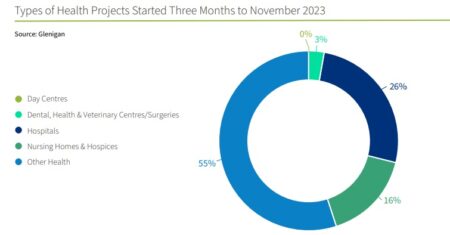Healthcare construction industry takes a battering
The healthcare construction industry continues to be impacted by high interest rates, a weak economic outlook, and political turmoil, with project starts on site plummeting by 50% in the three months to November.
According to the recently-released Glenigan Construction Review Extended Edition, health starts experienced a weak period, remaining 51% below 2022 levels.
This echoes other sectors where, overall, there was 44% decline in project starts against 2022 levels, a 49% drop in main contract awards, and a 12% decrease in detailed planning approvals compared to last year.
The report states that, within the health construction sector – which covers day centres; dental, health, and veterinary surgeries; hospitals; and nursing homes and hospices – main contract awards decreased in the three months to the end of November against both last year and the previous three months.
However, detailed planning approvals – often a good indication of the market moving forwards – grew on a year ago.

Key figures include:
- Adding up to £425m, underlying health work starting on site (less than £100m in value) during the three months to November fell 50% against the preceding three months on a seasonally-adjusted (SA) basis to stand 51% down against the previous year
- Major projects (£100m or more) starting on site totalled £300m, which is a 41% decline against the previous quarter, but almost three times higher than a year ago
- Overall, health starts slipped back 45% against the previous quarter and fell 25% on a year ago to total £725m
- Totalling £548m, health main contract awards were down 64% against the preceding three months and 44% down against a year ago
- Underlying contract awards experienced a mixed performance, increasing 6% against the preceding three months (SA) to stand 13% down against the previous year
- Detailed planning approvals, totalling £1.4bn, decreased 55% against the preceding quarter, but grew 22% on the previous year
- Major project approvals, totalling £615m, slipped back 74% against the previous quarter, but increased nearly five times against last year
- Underlying approvals at £870m experienced a 10% (SA) decline compared with the preceding three months to stand 20% down on a year ag0

Allan Wilen, Glenigan’s economics director, said: “Construction starts across all sectors remain low after sharp falls earlier in the year.
“High interest rates and a weak economic outlook continue to deter private non-residential investment while government-funded health and education starts were down sharply on the previous three months.”
Hospitals accounted for 26% of health work starting on site during the three months to November, with the value having decreased 62% against the previous year’s levels to total £191m.
Accounting for 16% of health projects starting onsite, nursing homes faced a 33% decline on a year ago to total £114m.
And dental, health, and veterinary centre project starts, accounting for 3% of the sector, slipped back 68% compared with the previous year to total £19m.
Unlike last year, there were no day centre project starts during the period covered by the report.

Regionally, the South East was the most-active area for health project starts during the three months to November, having jumped 75% against the previous year to account for 47% of health project starts.
Projects in the region included the £300m Ellison Institute for Transformative Medicine in Oxford.
At £41m, Yorkshire & the Humber accounted for a 6% share with the value of projects starting on site growing by 26% compared with 2022 levels.
Wales was the only other region that experienced growth, at 23%, to total £20m, accounting for 3% of health starts.
The Department of Health and Social Care remains the top client in the sector, with a total of 170 projects worth over £1.5bn.
Canary Wharf and Laing O’Rourke were the top two contractors for the period covered by the report, with one project each worth £500m and £300m respectively.

The league tables show the most-active clients and contractors in the sector
